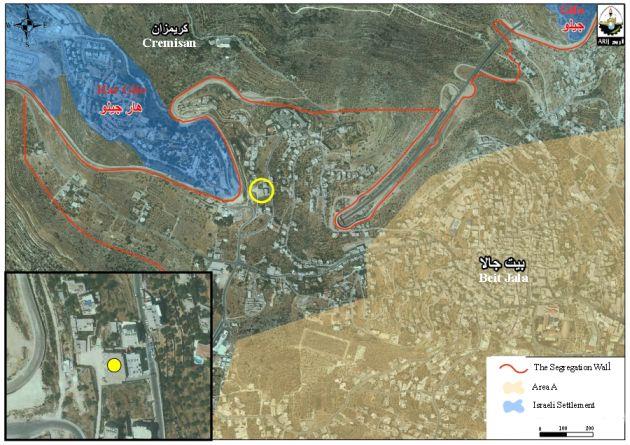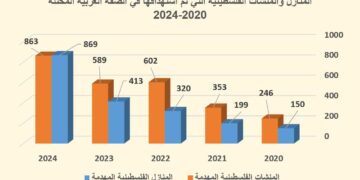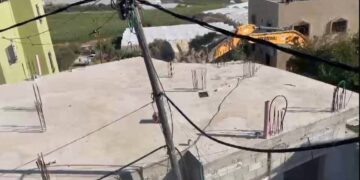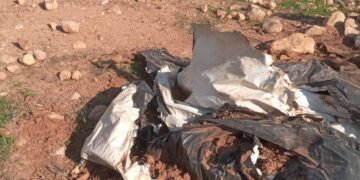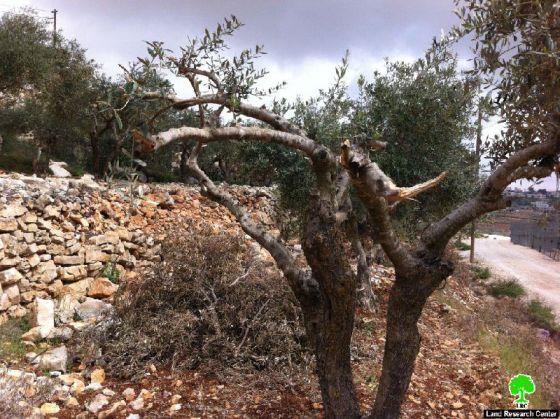On the 14th of March 2013, the Israeli Civil Administration (ILA) issued a military order to demolish a Palestinian building consisting of six floors (500 meters square area) in Beit Jala city and owned by Citizen Simon Al Araj. The order was issued under the claim that the property was built without a valid building license issued by the ILA due to its location in area “C”, which falls under the full Israeli control.
The Israeli demolition order which holds no. B (2/13) states that the existing property was built in violation of the fourth chapter of the Israeli City, Village, and Building Planning Law no. 79 of 1966 which was amended after the 1967 war by the Israeli Occupation Authorities on the basis of Military order No. 418 to comply with Israel’s interests and settlement plans in the occupied Palestinian territory. Citizen Al Araj was given a period of 30 days from the issuance date of the military order to immediately stop the construction of his building and demolish what has already been built. The Israeli Civil Administration threatened that if Citizen Al Araj doesn’t demolish the building and remove all what exists; it will take the necessary legal procedures, including the demolition of the building and return the land back to its previous status, at the expense of citizen Al Araj. See Photo 1
This event coincides with the impending visit of U.S. President, Barack Obama, to the occupied State of Palestine and to Israel on the 20th of March 2013, where also Israel is stepping up its practices against Palestinian lands and properties in the West Bank, a move that would make the political situation even more difficult and would increase the volume of the Palestinian suffering in the territories.
These practices will also impose more irreversible facts on the ground in violation of the international laws and human conventions, most specifically, article 11 (1) of the International Covenant on Economic, Social and Cultural Rights (1966) which ‘recognize the right of everyone to an adequate standard of living for himself and his family, including adequate food, clothing and housing, and to the continuous improvement of living conditions’.
The building of Citizen Al Araj
Citizen Simon Al-Araj started the construction of his building in the year 2000, after he got a verbal approval from the Israeli Civil Administration of Beit El to build in his land located in the area classified as “C” and at the same time, falls within the master plan of Beit Jala city. Accordingly, Citizen Al ArAj obtained the necessary building permit from the Municipality of Beit Jala in the year 2000 and constructed the first two floors of the building.
In September 2000, the second intifada erupted and Citizen Al Araj was forced to stop the construction of his building due to the difficult economic and political situation the country was going through.
In the year 2012, Citizen Al Araj renewed the license of his building to resume the construction of the remaining floors as planned. By the end of the year 2012, Citizen Al Araj managed to add four more floors to the already existing two. It is note worthy that the building is located opposite the Segregation Wall which Israel built on lands of Beit Jala city and encompasses the settlement of Har Gilo within its path. See Map 1
The geopolitical status of Beit Jala city Lands
According to Oslo II Interim Agreement of September 1995, around 65% of Beit Jala city lands[1] are classified as area C; an area that is under full Israeli control; accordingly, Palestinians seeking to build in their lands which are located in area ‘C’ are required a license/permit from the Israeli Civil Administration (ICA) office. In addition to being exceptionally costly in terms of fees, the license procedure, as stipulated by the Israeli Civil Administration, requires a long list of demands by the ICA office which is only the starting point of the License procedures. Until Palestinian owners are able to fulfill the demands of the ICA office, and documents are processed, years pass without an answer to applicants, and at the end, their applications are either ignored, postponed or rejected under the claim of not being able to meet the Israeli requirements.
To conclude:
The Israeli policy of demolishing Palestinian structures in the occupied state of Palestine allegedly for lacking valid building permits and other Israeli pretexts reflects Israeli’s policy in the territory and lack of respect to its obligations under international law and international humanitarian law, especially the fourth Geneva convention, Article 53 ‘any destruction by the Occupying Power of real or personal property belonging individually or collectively to private persons, or to the State, or to other public authorities, or to social or cooperative organizations, is prohibited, except where such destruction is rendered absolutely necessary by military operations.’ and article 147 which clearly prohibits ”extensive destruction and appropriation of property, not justified by military necessity and carried out unlawfully and wantonly.” and the International Convention on the Elimination of All Forms of Racial Discrimination, article 5 in which States Parties undertake to prohibit and to eliminate racial discrimination in all its forms and to guarantee the right of everyone, without distinction as to race, color, or national or ethnic origin, to equality before the law, notably in the enjoyment of the following rights:
(a) The right to equal treatment before the tribunals and all other organs administering justice;
(b) The right to security of person and protection by the State against violence or bodily harm, whether inflicted by government officials or by any individual, group or institution;
(c) Political rights, in particular the rights to participate in elections–to vote and to stand for election–on the basis of universal and equal suffrage, to take part in the Government as well as in the conduct of public affairs at any level and to have equal access to public service;
(d) Other civil rights, in particular: The right to freedom of movement and residence within the border of the State; The right to leave any country, including one’s own, and to return to one’s country; The right to nationality; The right to marriage and choice of spouse; The right to own property alone as well as in association with others; The right to inherit; The right to freedom of thought, conscience and religion; and the right to freedom of opinion and expression; The right to freedom of peaceful assembly and association;
(e) Economic, social and cultural rights, in particular: The rights to work, to free choice of employment, to just and favorable conditions of work, to protection against unemployment, to equal pay for equal work, to just and favorable remuneration; (ii) The right to form and join trade unions; (iii) The right to housing; (iv) The right to public health, medical care, social security and social services; (v) The right to education and training; and (vi) The right to equal participation in cultural activities;
(f) The right of access to any place or service intended for use by the general public, such as transport, hotels, restaurants, cafes, theatres and parks.
[1] The total area of Beit Jala city is 9177 dunums.

